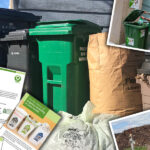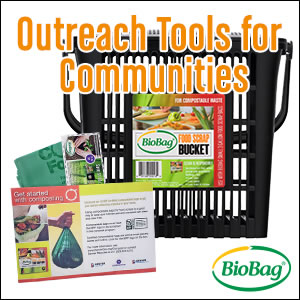Farm Aid has greatly increased organics diversion since 2007. Inspired by its partnership with Farm Aid, Live Nation announced its zero waste goal in September 2018.
Stephanie Katsaros
BioCycle November/December 2019
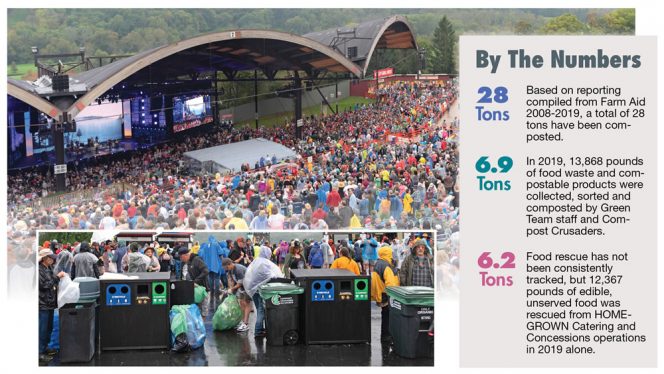
Farm Aid 2019 drew a crowd of 30,000 at the Alpine Valley Music Theater in Wisconsin in September. Sorting stations for organics, recyclables and trash were set up throughout the venue. Photos by Laurie Bonneau
A crowd of 30,000 festivalgoers from all 50 states descended on Alpine Valley Music Theater in East Troy, Wisconsin on September 21 for Farm Aid 2019. The event featured special sets and collaborations by board members Willie Nelson, Neil Young, John Mellencamp and Dave Matthews, in addition to rousing performances by other well-known and up-and-coming musicians. All performers donate their time and travel to this annual benefit concert, which has helped Farm Aid raise over $57 million since 1985, to support family farmers in America.
Beyond the music, Farm Aid provides education and advocacy in the HOMEGROWN Village — where farmers, “eaters,” and advocates can find interactive inspiration to waste less, grow more, enjoy healthier food, improve soil and water, and fight for climate justice. ”Our vote and our fork are important,” said Farm Aid’s communication director, Jennifer Fahy, during the preshow press event.
Launched in 2007, Farm Aid was the first event to divert organics at each of its host venues. From ”soup to nuts,” this enormous undertaking has included arranging organics collection, sourcing equipment, supplies, custom signage and volunteers, and compiling waste diversion data. It has succeeded in educating attendees on the importance of recycling and composting, with help from long-time partners Anne and Derek Bedarf of the Adaptive Collective, who directed 82 ever-more knowledgeable Green Team volunteers this year in front-of-house fan education.
In alignment with Farm Aid’s HOMEGROWN concessions good food purchasing policy, Legends Hospitality Services ensures plant-based, certified compostable cutlery is used to serve nothing but food made from sustainably grown ingredients, sourced from family farms at a fair price to the farmers. “We try to be gold standard, and lead the way,” explains Farm Aid Associate Director, Glenda Yoder. “It’s getting easier and better, but I’m eager to have this institutionalized (by music venues).”
Live Nation Ups Its Game
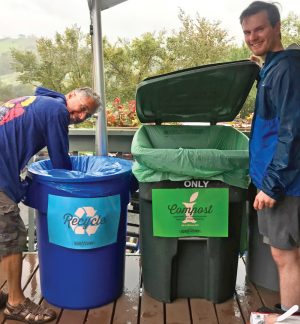
Food waste and certified compostable products were accepted in the compostables bin (right). Compost Crusader, based in Milwaukee, composted the materials. Photo by Stephanie Katsaros
In September 2018, live entertainment giant, Live Nation, announced its goal to achieve zero waste in 20 of the company’s owned and operated venues by 2020. Inspired and informed by its partnership with Farm Aid, Live Nation has begun use of certified compostable serviceware, educational signage, staff training, and dedicated sorting teams. Taking charge of coordinating and implementing composting and recycling operations at Farm Aid 2019, the company recruited sustainability teams from venues in Chicago and St. Louis to conduct critical back-of-house sorting of the majority of postconsumer event material, and brought in Milwaukee-based hauler, Compost Crusader, to manage the newly diverted organics stream. Melissa Tashjian, president of Compost Crusader, could be found doing final onsite sorts in the back of her compactor truck as she received material, demonstrating the attention to detail that can deliver a useable organics stream from large-scale events like Farm Aid.
According to Live Nation’s Manager of Venue Sustainability, Lucy August-Perna, organics recycling is now in place at 19 of its venues — in cooperation with composting facility partners like AgRecycle and Blue Earth Compost. But about half of the company’s venues are located in areas without the infrastructure needed to support its scale of operations. August-Perna hopes to work on creative solutions to help build composting capacity in those areas, as Live Nation continues initiatives to minimize waste and utilize the compostable food service material types preferred by their composting partners.
Advancing Composting At Special Events
Commitment, communication and contamination might overtake a word cloud about organics recycling at special events and festivals. Components of a successful strategy include:
• Commitment from the top down. In the music industry, this involves the event organizer, promoter and facility operator, all working together to ensure necessary resources are committed to implement the program.
• Financial implications of procuring alternative materials such as reusable or compostable serviceware, hauling services, training and labor, must be addressed.
• Program strategy, with internal expertise and/or external support, must identify key stakeholders and areas of waste generation, and include a means to communicate guidelines and expectations to all responsible parties. This often includes contractors — which means that contractual agreements should clearly specify goals and expectations. If organics diversion is set up in kitchens, backstage catering, bars and other food service and waste handling areas, associated staff must be geared up and trained to minimize confusion and contamination.
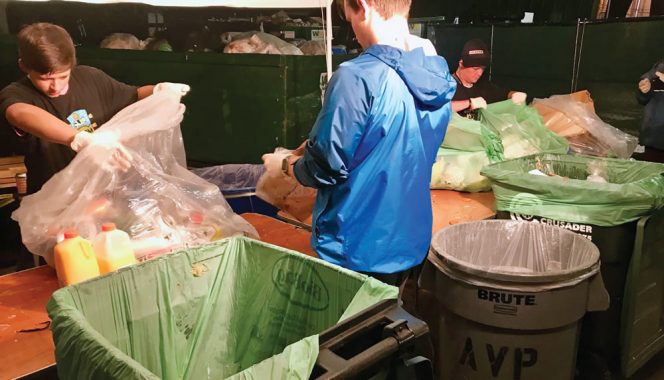
All bags of recyclables and compostables were inspected in a centralized location. Contaminants are removed before materials leave the venue. Photo by Stephanie Katsaros
Staff are not the only ones who need to be educated. Artists, crew and fans alike are not generally exposed to opportunities to separately sort their leftover food from recycling and landfill, so three streams often triples the confusion. Clear and consistent communication — especially signage at the point of disposal — is key to reducing contamination. Personnel, stationed throughout the venue to help attendees place items in the proper bin, provide meaningful education and invaluable support to reduce contamination, particularly if they sort misplaced items at their station. It may not be pretty, but when event participants witness hands-on efforts to “fix their mistake,” it delivers a powerful message of commitment and education at the same time. Still, no matter how effective separation is at each of these areas of waste generation, strategic sorting behind the scenes is crucial to providing the receiving facility with clean feedstock to put into its compost manufacturing operation.
Taking it to the next level, successful events targeting zero waste may require reusables in place of single-use items, plan menus to minimize surplus ingredients, and arrange for food rescue to aid local hunger relief. But none other than Farm Aid can get rockstars like Dave Matthews to give a shout out from the stage to ‘Make Soil!’ by composting.
Stephanie Katsaros covers music and environmental initiatives. She is the founder of Bright Beat, which develops and executes large-scale sustainability strategies for cities and special events, corporations, and nonprofits.



